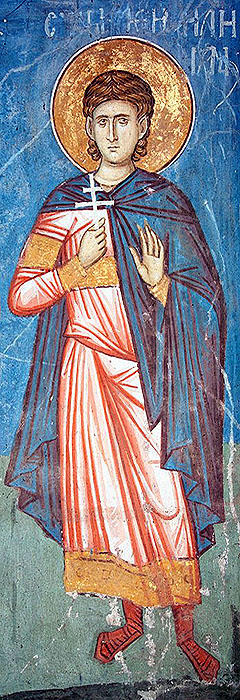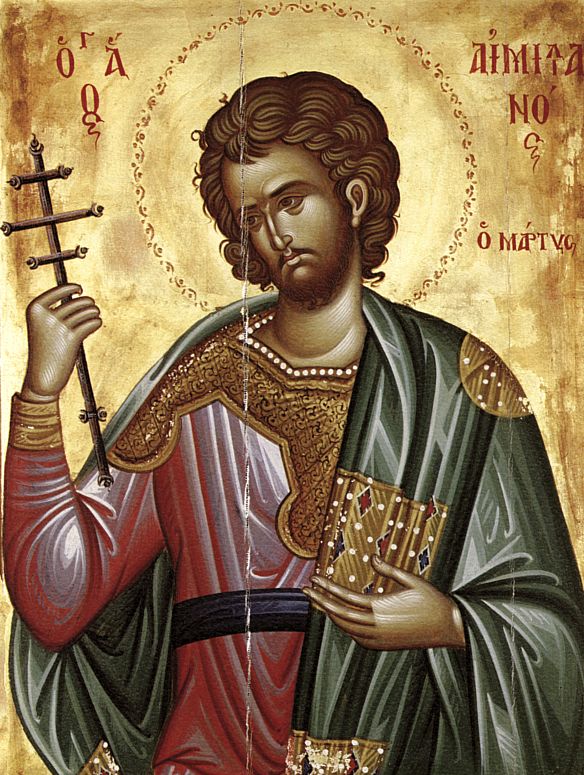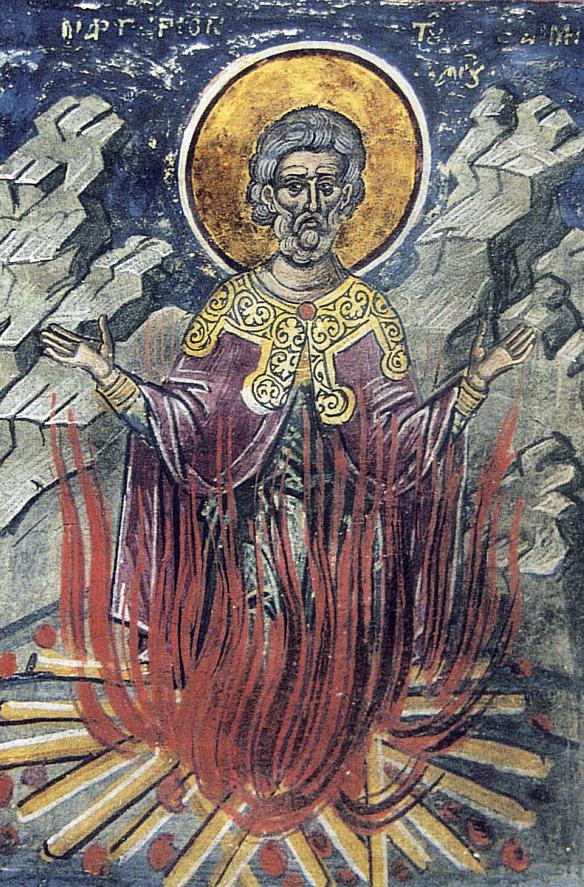Holy Martyr Aimilianos (18 July): free man and servant
18 July 2016When Julian the Apostate came to power as emperor (361), he scorned both the good that had been achieved by Saint Constantine the Great and everything he had gained from his own Christian upbringing. He upset public order with his tyranny and railed against God, doing his level best, with all means at his disposal to bring back the worship of idols. He sent officers faithful to his own aims into various provinces in order to force people to comply. With this in mind, Capitalinus, his deputy in Thrace, moved to Dorostolos (today’s Silistra, in Bulgaria), the capital of Skythia. Once he was established in his court, he directed threats against not only Christians but also those who were reluctant to betray them. The terrified population all insisted that there were no Christians among them and that everyone sacrificed to the gods of the emperor. Satisfied and delighted with this, Capitolinus then took part in a magnificent banquet staged in his honour.
 While they were all enjoying themselves lavishly, a noble young Christian, Aimilianos, who could no longer stand the affront to the true God and wished to earn the trophy of martyrdom, went into the temple, equipped with a hammer. He smashed the idols, overturned the lamp-holders and altars on which the offerings had been placed, poured away the wine for the libations and left unobserved. When the servants notified Capitolinus, he was outraged and ordered an investigation and the arrest of the perpetrator. The soldiers didn’t find anyone and were afraid to return to the tyrant empty-handed, so they arrested a villager who was returning from a field and dragged him to the praetorium, beating him with staves the while.
While they were all enjoying themselves lavishly, a noble young Christian, Aimilianos, who could no longer stand the affront to the true God and wished to earn the trophy of martyrdom, went into the temple, equipped with a hammer. He smashed the idols, overturned the lamp-holders and altars on which the offerings had been placed, poured away the wine for the libations and left unobserved. When the servants notified Capitolinus, he was outraged and ordered an investigation and the arrest of the perpetrator. The soldiers didn’t find anyone and were afraid to return to the tyrant empty-handed, so they arrested a villager who was returning from a field and dragged him to the praetorium, beating him with staves the while.
Faced with this sight, and unable to bear the prospect of someone who was innocent suffering in his stead, Aimilianos went to give himself up, declaring loudly that he was the culprit. Astonished and hesitant at first, the soldiers brought him to Capitolinus. With a scowl and bloodshot eyes, the judge asked him to reveal who he was and to say who had incited him to such an act. After Aimilianos had declared that he was, at one and the same time, a free man and a servant- a servant of God and free of the idols- he added: “It’s my love for God and the zeal I harbour for Christ that makes me want to suffer for Him. Just as it’s my disgust that I feel for those lifeless statues that convinced me and gave me the strength to destroy what is a disgrace for the human race. Because nothing degrades us who have the gift of reason, so much as worshipping unreasoning things and worshipping the works of our hands, rejecting the honour we owe to our only God and Creator”.
“Never mind your fancy words. Are you responsible for the sacrilege?”, asked the judge. Aimilianos answered that he was proud of his actions, which he considered to be the noblest and most devout of his whole life. Capitolinus ordered that he be stripped, stretched out on the ground and scourged. When the saint continued to mock idolatry, they turned him over and lashed him on the chest. When Capitolinus learned that Aimilianos was the son of the eparch of the city, Savvatianos, he declared that his noble extraction was no excuse and would not escape his punishment. In any case the saint refused to be found innocent or to use any extenuation in his defence. On the contrary, he asked to be punished as harshly as possible, so as not to be deprived of the crown of victory. Capitolinus, who was in a blind rage by now, condemned him to death by fire and imposed a heavy fine in gold, for his negligence.
The soldiers immediately laid hands on the saint and led him outside the city, to the banks of the Danube, where the pyre had already been prepared. When they cast him into the fire, the flames remained at a distance from his body and turned on the executioners themselves, who were burned to a cinder, while the saint continued to sing praises to God, just like the holy Children in the furnace in Babylon. He made the sign of the cross and, having commended his soul to God, departed this life in peace, and was received into the choir of those bold athletes of devotion to the Lord (18 July 362).
The wife of Capitolinus, who was a secret Christian herself, asked her husband to give her the corpse, which she then handed on to devout Christians so that they could bury it in Gizidina, three stadia away from Dorostolos.
Νέος Συναξαριστής της Ορθοδόξου Εκκλησίας (Ιούλιος) [New Synaxarist of Orthodox Church], Indiktos Publications, pp. 189-91.








